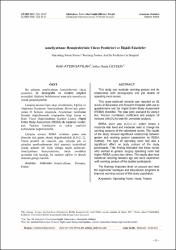Ameliyathane Hemşirelerinin Vücut Postürleri ve İlişkili Faktörler
Abstract
Bu çalışma, ameliyathane hemşirelerinin vücut postürleri ile demografik ve mesleki bilgileri arasındaki ilişkinin belirlenmesi amacıyla tanımlayıcı olarak gerçekleştirildi.Çalışma kesitsel tipte olup, örneklemini, Eğitim ve Araştırma Hastanesi Ameliyathane Birimi’nde görev yapan 81 hemşire oluşturdu. Araştırmacı tarafından literatür doğrultusunda oluşturulan bilgi formu ve Hızlı Vücut Değerlendirme Kontrol Listesi (Rapid Entire Body Assessment (REBA) ile toplanan veriler; test, Pearson korelasyon ve çoklu analizler kullanılarak değerlendirildi.Çalışma sonucu REBA ortalama puanı orta düzeyde risk grubu olarak değerlendirildi (6,9±2,12). Vücut postürü ile cinsiyet, yaş, çalışma yılı ve çalışılan ameliyathanenin türü arasında istatistiksel olarak anlamlı bir ilişki olduğu tespit edilmiştir. Ameliyathane hemşirelerinin, vücut postürleri açısından risk taşıdığı, bu nedenle eğitim ve destek almaları gereği önerildi. This study was evaluate working posture and its relationship with demographic and job details of operating room nurses. This cross-sectional research was reported on 81 nurses in Education and Research Hospital with use to questionnaire and the Rapid Entire Body Assessment (REBA) checklist. The data were analyzed by using t test, Pearson correlation coefficient and analysis of variance (ANOVA) tests for univariate analysis. REBA score was (6,9±2,12) which means a moderate risk level and moderate need to change the working postures of the voluntered nurses. The results of the study showed significant relationship between gender and working posture (assessment by REBA method). The type of operating room had also a significant effect on body posture of the study participants. This finding indicated that those nurses who worked in general surgery operating room had higher REBA scores than others. The results also have statistical meaning between age and work experience with working posture of the studied participants. The findings important level on posture and need for ergonomic tecniques and educational programs to improve working posture of this study population.
Source
Gümüşhane Üniversitesi Sağlık Bilimleri DergisiVolume
7Issue
1Collections
- Makale Koleksiyonu [141]
- TR-Dizin İndeksli Yayınlar Koleksiyonu [1037]



















